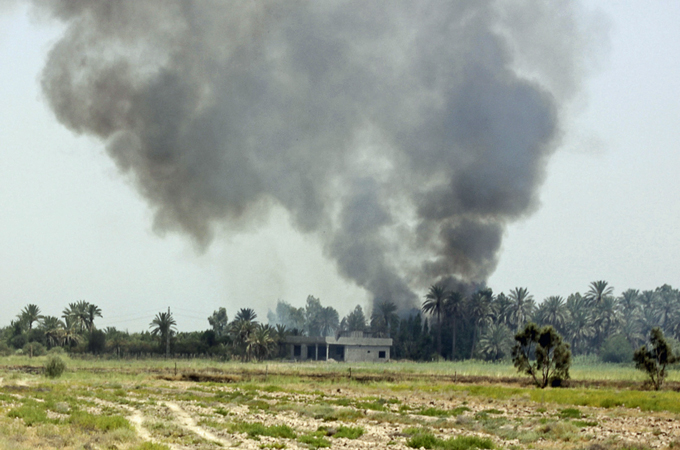The Iraqi military has launched air raids against armed groups trying to capture the country’s largest oil refinery, killing as many as 30 fighters, authorities said.
News of the latest attack on Friday came as government forces claimed to have recaptured the village of the late dictator Saddam Hussein, and as the country’s top Shia cleric denounced Iraq’s failure to form a new government.
A government plane targeted about eight vehicles attacking government forces at Baiji, north of Baghdad, Sabah al-Nuaman, the a top Iraqi security spokesman, told the AP news agency.
He said up to 30 rebel fighters were killed, but the number cannot be independently verified.
Government forces also reported the recapture Saddam’s village of Awja on Thursday night although again that report could not be verified.
Nuaman also said a helicopter gunship fired on a house in the town of al-Qaim near the Syrian border, where a gathering of local leaders of the Islamic State rebel group was taking place.
He said there were several casualties, but did not have a definite figure.
‘Regrettable failure’
Meanwhile, Iraq’s most powerful Shia cleric, Grand Ayatollah Ali al-Sistani, said on Friday that the Iraqi parliament’s inability to agree on a new government in its first session was a “regrettable failure.”
“Last Tuesday the first session of parliament convened. People were optimistic that this would be a good start for this council in its commitment to the constitutional and legal texts,” Sistani’s aide, Ahmed al-Safi, said at the Imam Hussein shrine in the Shia holy city of Karbala.
“But what happened afterwards, in that the speaker and his deputies were not elected before the session finished, was a regrettable failure.”
The prime minister has traditionally been Shia in Iraq’s governing system set up after the US toppled Saddam in 2003, while the speaker of parliament is Sunni and the largely ceremonial president is Kurdish.
None of the blocs has settled on a nominee. Opponents of the prime minister, Nouri al-Maliki, blame his divisive rule for the worsening crisis and are demanding that he be replaced.
Sistani on Friday reiterated his call for the new government to have “broad national acceptance”, a formulation many officials have interpreted as a signal Maliki should step aside.
Also on Friday, former Iraqi parliament speaker Osama al-Nujaifi, a major political foe of Maliki, said he would not nominate himself for another term to make it easier for the Shia political parties to replace the prime minister. Al Jazeera






 WhatsApp us
WhatsApp us 

